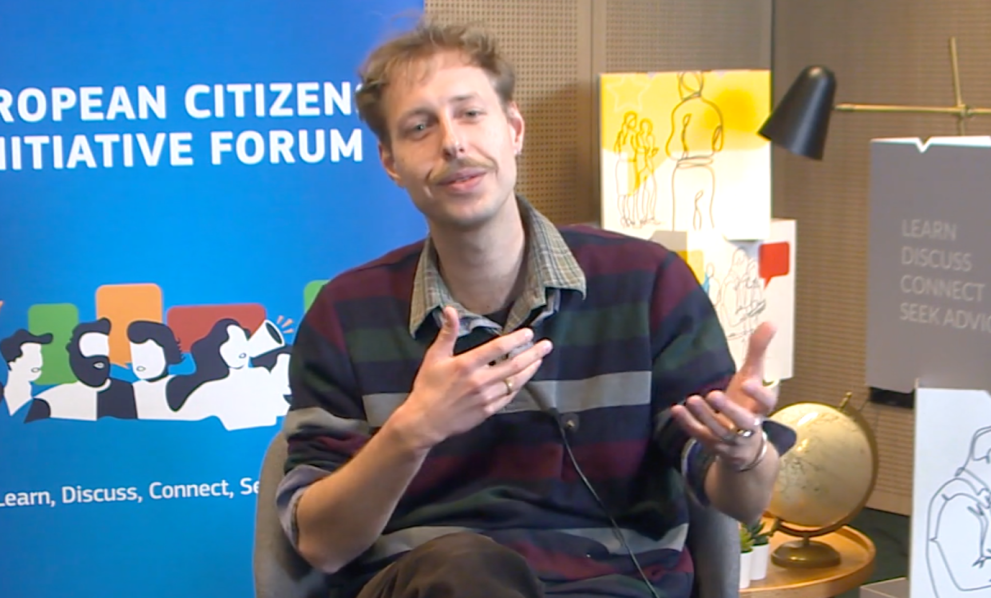In a bold move to address controversial issues related to the use of psychedelic substances in mental health care in Europe, the PsychedeliCare European citizens’ initiative is calling for the legal recognition and regulated use of psychedelic-assisted therapy. Led by Théo Giubilei, a passionate advocate with a background in European political studies, the initiative seeks to foster equitable, timely, affordable, safe, and legal access to innovative psychedelic-assisted therapies. In this interview for the ECI Forum, Théo Giubilei shares the origins of the campaign, the challenges of shifting stigma.
The Spark of an Idea: From Politics to Psychedelics
Théo: I had the idea of launching this initiative in July 2022. After I read a lot about this subject, I became passionate about the use of psychedelics in mental health and their potential to help people with mental health diseases. I have a Master's degree in European politics and public affairs, and I moved to Brussels to start working at an organisation and to do a traineeship in the Parliament, but I felt that I wanted to do more. I want to help people in the field of mental health and psychedelics.
Empowering citizens' action in Europe
Through my studies, I discovered the tool that is the European Citizens’ Initiative and I decided that this is how I could do my part in the movement.
When I came up with the idea, I started to reach out to some healthcare organisations, psychedelic societies, and mental health organisations across the EU. Some responded, and over a period of two years we worked on building this Initiative before we launched it on 14 January 2025.
The mental health crisis
And this affects not only us as individuals, but also as families, communities, and societies. On the other side, we have a lack of effective response and treatment for many people. For example, up to 50% of people that are suffering from severe depression resist the current treatments that are proposed.
Read more about the mental health situation in Europe and the EU approach to it.
Beyond the stigma: how psychedelic care works
Substances like LSD, MDMA, DMT, and psilocybin can help treat, alongside psychotherapy, people who are resisting current treatments, and in the end, help them heal and treat their mental conditions. But we don’t suggest that you should give these substances to someone and let them go home, telling them "Okay, you're going to be fine."
Liking this article so far? Register to become part of the conversation - join discussions, find partners, submit enquiries, and more!
Horizon: the future of mental health treatment
In Switzerland, since 2014 patients have already been able to access psychedelic therapies under certain conditions. For three years now they have been available in Australia and in Canada. There are some countries in the EU that are moving forward, like Czechia, the Netherlands, but in PsychedeliCare we believe, that every European citizen, if needed, should have access to those therapies.
Théo: We are calling upon the European Commission to take action in favour of these therapies, to propose a legislative framework and to put experts, patients and association representatives around the table to work on establishing the best practices, also to come up with a common position for the Member States, to challenge international regulations that are still slowing down research and policy initiatives.
Addressing stigma: a core objective
The initiative in itself is not only about the legal framework, it's also about reducing stigma. This is the main obstacle today when it comes to psychedelic therapies, the stigma surrounding psychedelic substances. With the initiative we want to show that there is a community of healthcare professionals and citizens’ association that are working towards the implementation of the therapies and recognising the benefits.
Building a network of supporters
At the beginning, I was only one citizen with a simple idea, and then I just started reaching out to some associations, presenting the topic and organising meetings to get to know each other, and to present what the European Citizens’ Initiative is and show them that it is exactly the tool we need to bring forward new legislation.
And then, little by little, you build alliances, you reach out to new associations and they might have a contact in another country or other organization in the same countries.
When we approached our partners, the core idea was for them to support our cause and to help us during the campaign, but we also asked them to help us build national teams, to find activists. We now have national teams of citizens who are also working hand in hand with our partners - some will help with activities, others will invite you for events and conference, others will help you with contacts.
Adapt your strategy depending on the Member State
What worked really well in Italy was finding one or two associations that were connected with all the people that wanted to speak about the issue and were ready to share the initiative. For us, this brought us 5 000 signatures in Italy in just one day, and it's the country that is leading the way.
What worked well in France was an influencer who contacted us because he wanted to share the initiative, notably to touch upon mental health. The interesting thing about this influencer is that he doesn't speak much about psychedelics, or mental health in general, but he has a lot of followers that are used to signing petitions, calls to governments, calls to members of national parliament, and when he shared the initiative, then people actually did sign it, and he brought us thousands of signatures in just a few hours.
Don’t be afraid about the million signatures you need to collect
These campaigns bring the voices of citizens who want to share their stories, and this will help break down the stigma. When citizens hear about stories that they can relate to, this helps build a different narrative to the one that was imposed to us for many, many years when we speak about psychedelic substances.
Even if you don't reach the one million signatures, you can bring the light on a topic that is important for you and for other citizens working with your initiative. Don't forget that the ECI is not only about the legislative outcomes, but it's also about bringing attention to a topic that is very special for you!
My vision is to see psychedelic-assisted therapies become a recognised and accessible treatment option within the European Union, offered within a safe, regulated medical framework. I believe that by giving healthcare professionals the tools and knowledge to utilise these therapies responsibly, we can offer new hope to the millions of Europeans who are currently suffering from mental health conditions and who don't respond to existing treatments. Ultimately, this initiative is about empowering individuals, improving well-being, and fostering a more compassionate and effective approach to mental health care across Europe.
The opinions expressed on the ECI Forum reflect solely the point of view of their authors and can in no way be taken to reflect the position of the European Commission or of the European Union.





Leave a comment